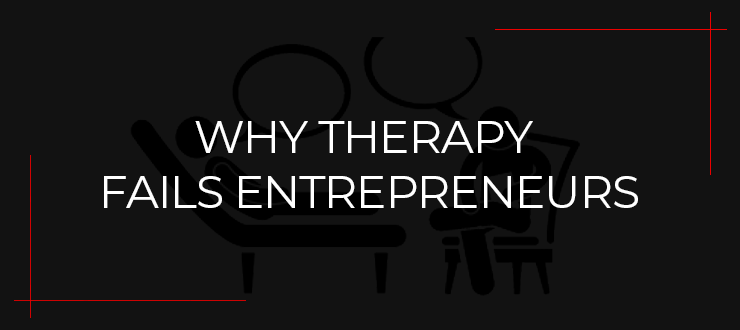Therapy was meant to heal trauma; the problem is that most entrepreneurs are using it to try to achieve their goals.
It's like if someone wants to put on muscle mass, but all they know about adding muscle is that they need to exercise… so they go out for a run.
When people say therapy is good or bad, they miss the point. Instead, they should ask if it's effective in getting them the outcome they want.
In pretty much any venture, there are two main reasons why people don't get the results they want:
- Ineffective strategy
- Ineffective execution
If you're an entrepreneur who feels that internal blocks are holding you back from executing your goals, this is for you.
The “C Players”
First, let's address a very controversial or "not nice to say" truth.
Just because someone is a licensed therapist doesn't mean they're competent. I don't know any entrepreneur who would fully trust someone to be their CEO just because they graduated with a degree in business, but this is exactly what people do with therapists.
They would never trust a wealth advisor with their money simply because they're a certified fiduciary. They would look at their track record and ask about the results they've achieved.
With therapists, people don't do that. I have not heard any entrepreneur tell me, "Before I started working with my therapist, I asked them about their results with other clients like me, what their 90-day plan would look like, and what key milestones can we expect to hit together."
People don't take bringing this potentially very impactful individual onto their team with the same seriousness as they would elsewhere in their life and business.
Why?
Perhaps it's uncomfortable. Or maybe they think, "You're not supposed to do that." Or perhaps a therapist told them, "That's not how this stuff works." They accept that because they're not familiar with this field.
Emotional problem-solving is still a very new field. Measuring results or success rates and establishing effective vs ineffective therapists is still taboo.
But the reality is that just like everything else in life, there are levels to the game. Some therapists are sharp thinkers with the emotional discipline and awareness to put the client first. Some are not.
Some people went into learning psychology to heal their own wounds and are still figuring things out for themselves.
Some are just not that good. Since the barrier to entry to study psychology at most colleges and universities is much lower than the one to study physics or engineering, you get some C-level players with degrees that people feel uncomfortable challenging.
I was very fortunate that my first encounter with therapy with the Mossad's head psychologist. He is a former Air Force pilot and undercover agent himself who competes in Ironmen competitions as a hobby—a legit A player, top to bottom. A top performer focused on helping other top performers overcome what's slowing them down so they could go on to be their best.
Therapists aren't magical guides. They're human beings, and just like every other profession, there are levels to the game. Some are highly skilled professionals. Some are total amateurs.
Some have emotional maturity and can fully put the client first, and some are unknowingly still patching up their own personal wounds that drew them to study psychology in the first place.
So that's the first thing. Therapy might have failed you because no one is comfortable telling you, "Your therapist might have just sucked."
Is Therapy the Wrong Tool?
For some people, conventional therapy is the most effective strategy.
It will help them deal with and overcome their trauma, but the implementation of it was poor because their therapist was a C player.
They chose the right strategy but needed a better guide to help them execute it.
But regardless of how good the guide is, for a lot of the ambitious entrepreneurs I work with, therapy is the wrong path.
Therapy is usually taught and studied with the goal of healing trauma in mind. Not the goal of enabling peak performance and executing towards tangible goals.
It's aimed at getting someone from -5 to 1 or from "depressed" to "functional."
That's very different than getting someone from 80 to 100.
The problem is that these two very different goals get lumped together.
Starting a conversation with "Tell me what happened?" instead of "Tell me where you're trying to go?" Will shift your focus towards your past instead of figuring out where you want to go.
Those are two very different intentions.
If you have trauma and your goal is to heal that trauma, "Tell me what happened" can be a great question to start with.
However, if your goal is to achieve the next level of success in your business or personal life, it's suboptimal.
Problem-focused vs Emotion-Focused
If an entrepreneur is trying to solve a problem like "How do I scale my company by X amount of millions more?" Then, asking them, "Tell me what happened in your childhood?" isn't very effective.
Yes, it's probably better than doing nothing… and since vulnerability is applauded, people go for it.
There's a hope that there will be a thread somewhere connected to "Oh, this happened to you back then. It still bothers you. It drains your energy in various places in life…
And that's why you're struggling to get up energized in the morning to do the one thing that will help you scale the business."
But that's an indirect path.
If you wouldn't tolerate that approach in your business, why should you tolerate it here?
You will need a different toolkit to go from above average to elite. One focused on getting you from 80 to 100 and executing towards a specific goal.
A 5-Step Framework to Go from 80-100
Here's a 5-Step Process:
- Clarify the goal: What do you want?
- Reverse engineer a game plan: What concrete actions will make it happen?
- Identify the resistance: What's holding you back from executing? Whether it's a fear, a belief, a hesitation, a discomfort, or whatever you want to call it. Your goal is only to uncover why you're resisting actioning your game plan (The rest of your childhood or whatever it may be is irrelevant at this point).
- Stress test your fear: Is it a valid logical concern or just an emotional worry? After you uncover what's holding you back from taking the most impactful action, it's time to see if it's a valid logical concern where you should back off or just an emotional worry you need to learn to deal with.
- Be a pro: Will you commit to doing the right thing regardless of how it feels?If you recognize that no actual harm will come to you if you execute the impactful actions, then you must commit. Commit to being an adult who does the right thing regardless of how it feels.
David's 5-step Goldmine
David was sitting on a gold mine. But he hadn't pulled the trigger for months despite wanting to retire his wife.
He had a giant list and a business perfectly suited to take advantage of it.
Also, one of his friends, an expert in the field, gave him a clear blueprint for success. "If you just do X, you'll have 4x your profits this month."
He hadn't pulled the trigger despite:
- Having a clear goal (to retire his wife)
- Having a step-by-step game plan
David had gone to therapy for years, and it made him feel generally more at ease, but it wasn't helping him move forward toward the future that he wanted for his wife and their family.
He was stuck.
Some internal resistance was holding him back from executing what he knew would serve him and the life he wanted.
So, instead of asking general questions, I asked him a very specific one.
"What do you think is stopping you from actually wanting to do this?"
We dug into it, and after breaking down that it wasn't a concern about additional workload or management complexities, it came down to one thing.
He had a fear of making more money.
At first, he said, "I don't want my list to get upset with me or think I'm a sell-out."
So I asked him why they would think that.
He responded, "Because making money is greedy." followed by a wide-eyed silence.
That was step #3. We uncovered exactly what kept him stuck and unable to execute his game plan.
David believed his biggest desire was to retire his wife, but he was more connected to that voice in his head that told him, "Making money is greedy." It created a push-pull that left him confused, stuck, and unable to execute.
Subconscious voices of guilt and shame dictated his actions and kept him and his business small.
David quickly realized that this blindspot around money and guilt was holding him back from growing the business.
When I asked him if he thought making more was greedy, he replied no.
He said, "Making money allows you to be extremely generous and giving."
That was step #4. He logically understood that the belief that "Making more money is greedy" wasn't true. This belief had been formed from what he saw growing up. But things started to click once he understood that his money belief was an emotional worry and not a valid logical concern.
He knew what he needed to do and why it was a good idea, but it still didn't feel easy.
Why? Because overriding 40 years of conditioning doesn't feel natural or easy.
As obvious as it might sound, we sometimes forget that when we step out of our emotional comfort zone, it feels… you guessed it… uncomfortable.
So what did David do?
He decided to be a pro and act with courage.
He didn't wait to feel 100% at ease. He stepped up and committed to doing what he knew was right regardless of how it felt.
And within a month, he 4xed his business and retired his wife.
He followed the 5 part framework:
- Clarify the goal: Retire his wife.
- Reverse engineer a game plan: The blueprint his friend gave him
- Identify the resistance: His money belief, "Making more money is greedy."
- Stress test your fear: Not valid. "Making money allows you to be extremely generous and giving."
- Be a pro: He committed, followed the blueprint, 4xed the business, and retired his wife.
Now it's up to you.
If your goal is to heal past trauma, conventional therapy could be an excellent tool for you.
However, if your main goal is to achieve more tangible goals, you're now armed with a 5-step framework to go from being confused and stuck to executing with confidence and courage.
Who dares wins,
Itamar

